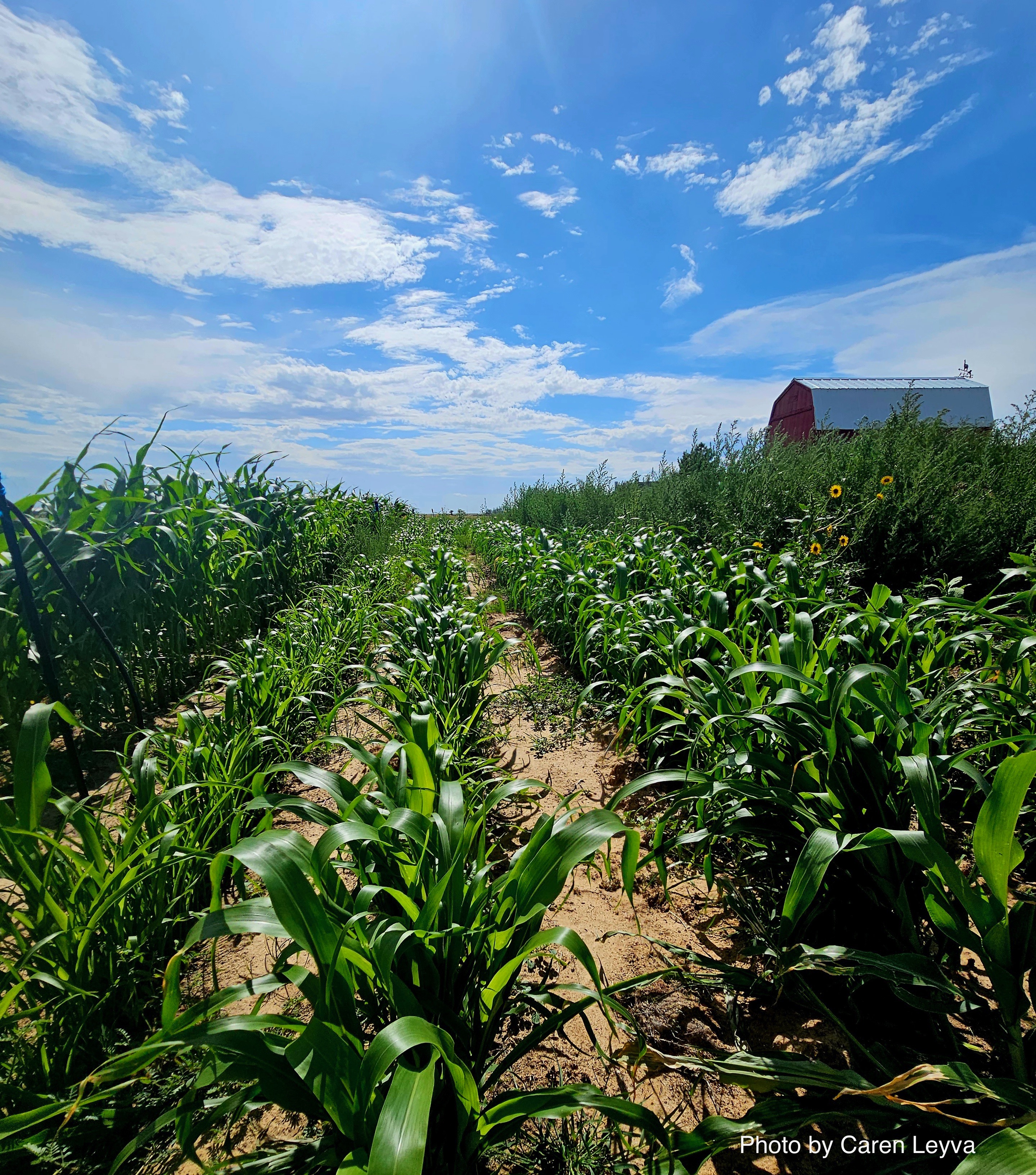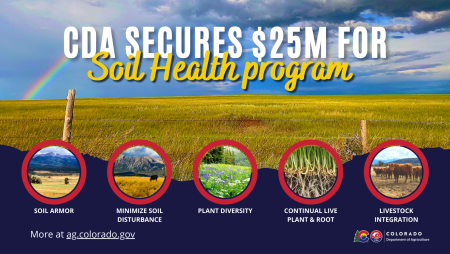Colorado Soil Health Program Background

Origins of the Soil Health Program
The passage of HB21-1181 “Agricultural Soil Health Program” in 2021 authorized CDA to run the Colorado Soil Health Program. The legislation also created the Soil Health Advisory Committee State stimulus funding provided through SB21-235 funded the program in 2022. Grant funding in 2022 and 2023 also came from a section 319 grant through CDPHE, a Water Plan grant from CWCB, and a Conservation Partners Program grant from NFWF, and a Federal Conservation Innovation Grant from NRCS.
In 2022, CDA received a $25 million Climate Smart Commodities grant from the U.S. Department of Agriculture to expand the Colorado Soil Health Program program over four years.
The Colorado Soil Health Program utilizes the Saving Tomorrow’s Agricultural Resources (STAR) framework. STAR helps farmers and ranchers to evaluate their current production system, identify areas for improved management to increase soil health, document their progress, and share their successes. The evaluation system assigns points for management activities on an annual basis and scores are converted to a 1 to 5 STAR Rating, with 5 STARs indicating commitment to a suite of practices proven to improve soil health, water quality and water availability.
Originally developed by Champaign County Soil and Water Conservation District (CCSWCD) in Illinois, STAR is now also administered in several states. In Colorado, STAR evaluates 11 different cropping systems and grazing lands for soil health.
Climate Smart Commodities Grant
Expanding the STAR Program Across Colorado and The West
In September 2022, the Colorado Department of Agriculture was selected for funding by the United States Department of Agriculture (USDA) through the Partnerships for Climate-Smart Commodities Project.
The $25 million grant is an historic investment in Colorado agriculture that will advance farmer- and rancher-led soil and climate solutions.
The STAR (Saving Tomorrow’s Agricultural Resources) program was built to serve everyone from the smallest producer to the largest, across all production types. This commitment to soil health and voluntary, incentive-based stewardship practices has been a key priority for the State of Colorado. STAR was shaped from the ground up by farmers, ranchers, conservation districts, and other partners who helped CDA tailor it to work for different crops, range, and different ways of farming and ranching across the state.
This investment for Colorado’s farmers, ranchers, and agricultural communities means a significant influx of funds to help producers absorb the financial risks of adopting new cropping and rangeland practices that advance soil health and climate resilience.
What the Climate Smart Commodities grant does
The grant funding will be used to more than double participation in the STAR program across Colorado, expand research on the benefits of regenerative agriculture across seven Intermountain West states (NM, WY, UT, ID MT, WA, CO), scale the model nationwide, and continue building markets for producers deploying climate-smart agricultural practices.
The grant will fund the expansion of soil health practices on more than 56,000 acres across Colorado. Healthy soils are key to combating the effects of climate change in agricultural landscapes. Improving soil health can increase carbon sequestration, reduce agricultural runoff, decrease erosion, and support more productive, nutritious crops. Conservation districts and eligible entities act as a local expert and grant administrator, and are a key part of the STAR Plus Program.
Each field enrolled in STAR Plus will do a soil test in Year 1 and Year 3, and soil moisture probes will be installed. Data from these tests and probes will be presented to the producer at the end of the grant period so they can make informed decisions about next steps.
Research and outcomes of the grant
This grant funds soil health research across the Intermountain West. In partnership with land grant universities across the West, observational data will be collected and analyzed from a network of 35 research fields across seven states.
Research fields will receive additional soil samples, soil moisture probes and weather stations; COMET-Farm and COMET-Planner analysis; soil organic matter fractions (to determine the stability of soil organic carbon), lab-based MIR spectroscopy for soil organic matter chemical characterization, and a suite of soil health analyses.
The grant will also fund eight economic case studies to understand the annualized cost of greenhouse gas reduction benefits, GHG benefit per dollar expended, and impacts on yields, water availability, and other on-farm variables. These case studies will be shared with producers and state policymakers. Though there will not be an economic analysis for each farmer, the breadth of the case studies will help stakeholders understand the impact of climate-smart agriculture.
Contact the Soil Health Program
305 Interlocken Pkwy
Broomfield, CO 80021
cda_soil@state.co.us
John Miller, Soil Health Program Coordinator (970) 985-2510
Suzie Bilberry, Grants Administrator (720) 519-5272
